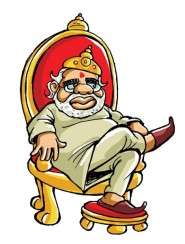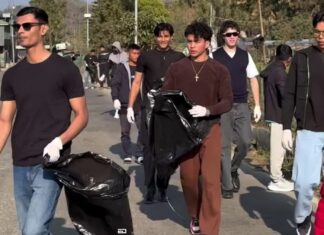Beginning on 7th April and lasting till 12th May of this year, the world will witness the largest act of its kind in history as 815 million eligible people in India go to polling booths to elect government at centre. Predictions of a coalition government at centre headed by BJP is rife in the political scenario of the country. In such a case it becomes important to analyse and subject to every possible scrutiny our most probable next prime ministerial candidate- Mr. Narendra Modi.

This maverick politician was born in 1950 on 17th of November as the third of six children to a family of grocers. As a child, he would help his father sell tea at railway stations and on trains. Described by his teachers as an average student, he would take active participations in theatre, a skill that would later help him understand the nuances of public speaking. Mr. Modi started his political career as a pracharak ( campaigner ) of the Rashtriya Swayamsevak Sangh (RSS ) and was soon given charge of its student wing, the ABVP. Subsequent transfer to the BJP provided the thrust to his political career and here his ambitions were realised when he was appointed the chief minister of Gujarat in 2001. The following year, 2002, turned out to be one of the most controversial years of Indian history when following the burning of 60 hindu pilgrims inside a train near Godhara led to one of the worst anti-muslim pogroms India had witnessed so far. Although the Modi government took apparent steps to control the violence, its stance during the period remains one hotly debated. Although the violence led to his subsequent resignation as nearly every political class in the country, friends and foes demanded , his government came back to power on majority in the subsequent assembly elections.
However this second term, he apparently took active steps to distance himself from the Hindutva ideology and focussed on core economic development of the state. Working on the slogan “Vibrant Gujarat”, he has helped create the brand Gujarat in the country as a state of dynamic development, economic growth and prosperity. Although there are still differences of opinions, most notably of the Nobel Laureate Amartya Sen that he does not endorse the Modi-nomics as it has largely benefitted urban middle class while doing not much for the rural poor; yet his charm has worked on a majority of corporate leaders who have invested heavily into his state and vouch for his appointment as the next prime minister. Although he was cleared by the SIT in 2012 of involvement in Gujarat anti-muslim violence, indictment of Amit Shah, his close confidante and Maya Kodnani, his cabinet minister, in riot related violence still casts doubts over the robustness of the report.
These hard facts aside, we must assess the man who has been virtually announced as politically ‘untouchable’ by hordes of opposition parties in lights of genuineness. Although the full extent of his participation, or lack of participation in the riots may never be fully judged; the repeated clearances from various investigative bodies including the Supreme Court should lessen it down to considerable extent. It becomes more appalling when political parties are unwilling to have discourse with him when he is set to play such a massive role in the coming elections. That should in itself shed the light on the sincerity of those very political parties because even if they plan on sitting in opposition to him, they are still bounded by the constitution to have wide-ranging and meaningful discussions with him. ‘Secularism’ is a holy concept but it seems to have been grossly misused to sound themself more appealing by most of the political class and has in majority of cases been the only issue to oppose him. This appears to be a ridiculous interpretation of the ethics of an ideological fight amongst political parties in a democracy. As the country waits for the verdict to come out, it seems an interesting prospect to see how the country’s electorate perceive the chaos!

































